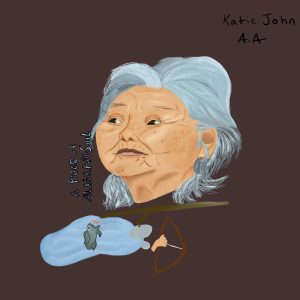16 Katie John (she/her)
By Sarah Adera (she/her)

Katie John, an indomitable matriarch and fierce advocate for Indigenous rights, stands as a monumental figure in the history of Alaska’s Ahtna Athabaskan community. She was born in 1915 in Slana, Alaska. John’s life journey of 97 years bridged traditional Native village customs and modern Western life, marking her as a pivotal source in the cultural and legal landscapes of Alaska. Raised in Batzulnetas – a site steeped in Ahtna heritage, her early years were rooted deeply in the practices of subsistence living, which profoundly shaped her values and actions.
From a young age, John was immersed in a lifestyle that thrived on the rhythms of nature, learning the intricate skills of living off the land from her mother and grandmother. Her profound connection to her ancestral lands later fueled her activism, particularly her leadership in the landmark ‘Katie John case’. This legal battle began in 1985 when John stood against the Alaska State Board of Fisheries to reclaim subsistence fishing rights at Batzulnetas, rights that had been unjustly stripped away two decades earlier. Her relentless pursuit led to significant legal victories, compelling the board to reshape the management of Alaska’s natural resources.
Katie John’s commitment extended beyond environmental stewardship. She was a cultural beacon involved in preserving the Ahtna Athabascan language and traditions. In the early 1970s, she helped develop the first written alphabet for her language, recorded pronunciation guides, and taught generations of her community, reaching over 250 descendants. Her efforts were recognized in 2011 when the University of Alaska Fairbanks honored her with an honorary doctorate of law for her unwavering dedication to cultural preservation and legal advocacy.
Moreover, John’s influence stretched beyond immediate legal victories. She was instrumental in fostering a greater understanding amongst policymakers and the broader public of the importance of traditional practices to Alaska’s Indigenous populations. Her case highlighted the interconnectedness of environmental stewardship and cultural identity, making a compelling argument for the rights of Indigenous people to maintain their traditional ways of life in the face of modern legal and political challenges.
Her legacy is encapsulated not just in her legal triumphs but in the cultural revitalization she fostered among her people. The impact of her life’s work continues to resonate, securing her place as a cornerstone of Ahtna’s heritage and a symbol of enduring strength and resilience. Katie John’s story is a powerful testament to the spirit of a woman who lived by the principles of her ancestors, ensuring future generations could do the same. Her life reminds us how standing firm in one’s beliefs can indeed forge pathways for justice and cultural continuity.

